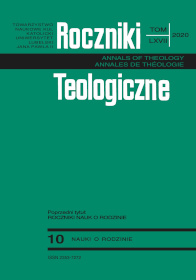Family as a Determinant of Aggresive Behavior in Children with Intellectual Disorders
Abstract
The article talks about the causes of aggressive behavior in children with intellectual disabilities of different age. It has been noted that behavioral disorders in children with intellectual disabilities occur in 25% -84% of cases, and the development of both positive and negative traits depends directly on family upbringing and education in the family. The study of the social situation of development of children and adolescents with intellectual disabilities confirmed the presence of predominantly negative characteristics of the social, cultural, educational and professional status of families in which children with intellectual disabilities are raised, which can be a source of influence that contradicts social norms. Unfavorable conditions in families of children with intellectual disabilities, lack of behavior, disability of proper behavior from parents, demonstration of aggressive behavior in the family and ensuring its support also cause aggressive tendencies in the behavior of this category of children.
It has been found that unfavorable family situation, conflicting in children with intellectual disabilities increases with age, reaching the highest level before adolescence.
It is proved that negative perception of a child with intellectual disturbance of a family situation, lack of emotional connections between family members, feeling of rejection and rejection of a child by adult family members causes not only manifestations of aggression, but also formation of aggressive behaviors.
References
Андреева, Г.М. Социальная психология. Москва: Аспект Пресс, 1996. [Andreeva, H.M. Socyal’naya psyxolohyya. Moskva: Aspekt Press, 1996].
Аунапуу, Т. “Трудновоспитуемость: некоторые причины возникновения и пути профилактики.” In: Вопросы специальной психологии и дидактики. Вып. 826: Труды по дефектологии, 29-35. Тарту, 1988. [Aunapuu, T. “Trudnovospituemost’: nekotorye prichiny vozniknovenija i puti profilaktiki.” In: Voprosy special'noj psihologii i didaktiki. Vyp. 826: Trudy po defektologii, 29-35. Tartu, 1988.].
Бодалев, А.А. Личность и общение. Москва: Международная педагог. академия, 1983. [Bodalev, A.A. Lichnost’ i obshhenie. Moskva: Mezhdunarodnaia pedagog. akademiia, 1983].
Бочкарёва, Г.Г. “Психологическая характеристика мотивационной сферы подростков-правонарушителей.” In: Изучение мотивации поведения детей и подростков, 259-350. Под ред. Л.И. Божович, Л.В. Благонадежиной. Москва: Педагогика, 1972. [Bochkarjova, G.G. “Psihologicheskaja harakteristika motivacionnoj sfery podrostkov-pravonarushitelej.” In: Izuchenie motivacii povedenija detej i podrostkov. Ed. L.I. Bozhovich, L.V. Blagonadezhina, 259-350. Moskva: Pedagogika, 1972].
Bronfenbrenner, U. “Ecological models of human development.” Readings Dev. Child. (1994), 3: 37-43.
Chao, M. “Family interaction relationship types and differences in parent-child interactions.” Social Behavior & Personality: an International Journal (2011), 39, 7: 897-914.
Del Rosario, M., Gillespie Lynch, K., Johnson, S., Sigman, M., Hutman, T. “Parentrepor ted temperament trajectories among infant siblings of children with autism.” Journal Autism Dev Disord Osborne LA (2014), 44: 381-93.
Einav, M. “Perceptions About Parents’ Relationship and Parenting Quality, Attachment Styles, and Young Adults’ Intimate Expectations: A Cluster Analytic Approach.” Journal of Psychology (2014), 148, 4: 413-434.
Гарбузов, В.И. Практическая психотерапия, или как вернуть ребенку и подростку уверенность в себе, истинное достоинство и здоровье. Санкт-Петербург: АО «Сфера», 1994. [Garbuzov, V.I. Prakticheskaja psihoterapija, ili kak vernut’ rebenku i podrostku uverennost’ v sebe, istinnoe dostoinstvo i zdorov’e. Sankt-Peterburg: AO «Sfera», 1994].
Иванов, Е.С. “Биологические и социальные факторы в формировании нарушений поведения у учеников вспомогательных школ.” In: Биологические и социальные факторы в формировании нарушений поведения у детей и подростков: межвуз. сб. науч. трудов, 22-25. Львов, 1989. С. [Ivanov, E.S. “Biologicheskie i social’nye faktory v formirovanii narushenij povedenija u uchenikov vspomogatel’nyh shkol.” In: Biologicheskie i social’nye faktory v formirovanii narushenij povedenija u detej i podrostkov: mezhvuz. sb. nauch. trudov, 22-25. Lvov, 1989].
Keim, S., Klärner, A., Bernardi, L. “The Strength And Family Formation: Which Personal relationships are influential.” Personal Relationships (2013), 20, 3: 462-478.
Коробейников, И. А. Нарушения развития и социальная адаптация. Москва: ПЕР СЭ, 2002. [Korobejnikov, I.A. Narushenija razvitija i social’naja adaptacija. Moskva: PER SE, 2002].
Личко, А.Е. “Психопатии и акцентуации характера у подростков.” In: Психология индивидуальных различий. Под ред. Ю.Б. Гиппенрейтера, В.Я. Романовой, 288-318. Москва: Изд-во МГУ, 1982. [Lichko, A.E. “Psihopatii i akcentuacii haraktera u podrostkov.” In: Psihologija individual’nyh razlichij. Ed. Ju.B. Gippenrejter, V.Ja. Romanova, 288-318. Moskva: Izd-vo MGU, 1982].
Мид, М. Культура и мир детства. Сост. И.С. Кон. Москва: Наука, 1988. [Mid, M. Kul’tura i mir detstva. Ed. I.S. Kon. Moskva: Nauka, 1988].
Поппе, Г.К. “Нарушения поведения у олигофренов.” In: Биологические и социальные факторы нарушений поведения у детей и подростков, 55-76. Львов, 1989. [Poppe, G.K. “Narushenija povedenija u oligofrenov.” In: Biologicheskie i social’nye faktory narushenij povedenija u detej i podrostkov, 55-76. Lvov, 1989].
Руденко, Л.М. Особливості агресивної поведінки розумово відсталих дітей: монографія. Київ: Вид-во НПУ імені М.П. Драгоманова, 2013. [Rudenko, L.M. Osoblyvosti ahresyvnoyi povedinky rozumovo vidstalyx ditej: monohrafiya. Kyiv: Vyd-vo NPU imeni M.P. Drahomanova, 2013].
Запрягаев, Г.Г. Психологическая характеристика умственно отсталых подростков с трудностями поведения: дис. … канд. психол. наук. Мoskva, 1986. [Zaprjagaev, G.G. Psihologicheskaja harakteristika umstvenno otstalyh podrostkov s trudnostjami povedenija: dis. … kand. psihol. Nauk. Moskva, 1986].
Copyright (c) 2020 Roczniki Teologiczne

This work is licensed under a Creative Commons Attribution-NonCommercial-NoDerivatives 4.0 International License.





